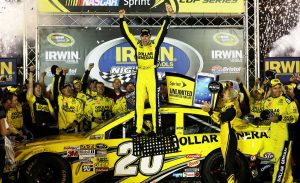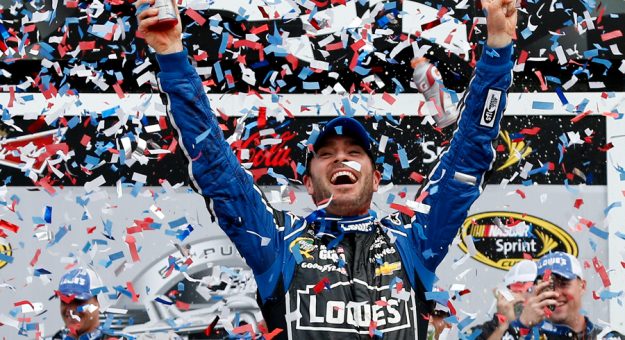Editor’s Note: NASCAR is celebrating its 75th anniversary. SPEED SPORT was founded in 1934 and was already on its way to becoming America’s Motorsports Authority when NASCAR was formed. As a result, we will bring you Part 66 of a 75-part series on the history NASCAR.
The Chase for the NASCAR Sprint Cup came down to the two best drivers over the course of the 36-race season. Still, 2003 series champion Matt Kenseth was unable to keep Jimmie Johnson from claiming his sixth series championship.
It was somewhat ironic that Kenseth had the best season of his career and came up short in the race for the championship, as it was Kenseth’s 2003 conquest, during which he won only one race, that led to the creation of the NASCAR playoffs.
The year after Kenseth won the championship, NASCAR split the season with the top 10 drivers after the first 26 races qualifying for a 10-race playoff showdown.
In 2004, Johnson was the best driver in the first 26 races, but faltered at the end and finished second to Kurt Busch. In 2005, Johnson again led the points for most of the regular season, but Tony Stewart snagged the championship.
Two years of the Chase produced two disappointments for Johnson and the No. 48 Hendrick Motorsports team.
Johnson and crew chief Chad Knaus then figured out what it took to succeed over the final 10-race Chase with the first of a record five-straight Cup championships beginning in 2006. Johnson had built a point lead so great by mid-season he could have sat out two races and stayed atop the standings.
Johnson started the season by winning the Daytona 500 and never looked back.
But while Johnson built a huge advantage in the points, a four-race slump by Johnson actually saw Carl Edwards — not Johnson — as the point leader under the traditional points following the Richmond race. But that really didn’t matter because once the Chase field was reseeded with bonus points based on victories, Kenseth began the Chase No. 1 with Johnson three points behind.
In his first season driving for Joe Gibbs Racing and Toyota, Kenseth won the first two races during the Chase and appeared on the fast track to the championship.
Kenseth was solid but he couldn’t shake Johnson. When Johnson won at Dover (Del.) Int’l Speedway at the end of September, he was just eight points behind Kenseth. Johnson trailed by three points following the race at Kansas Speedway and four markers after the Oct. 12 round at Charlotte Motor Speedway.

He snagged the point lead when he finished 13th and Kenseth was 20th at Talladega (Ala.) Superspeedway the following weekend. Kenseth then gained ground at Martinsville (Va.) Speedway and with three races to go, the duo was tied in the points.
Johnson drove to a dominant victory at Texas Motor Speedway, but led by only seven points as the series headed to Phoenix Int’l Raceway for the penultimate round.
Kenseth was never in contention at the one-mile oval, finishing 23rd. Johnson came home third and headed to the finale at Homestead-Miami Speedway with a 28-point advantage.
Kenseth won the pole and finished second at Homestead, but Johnson stayed out of trouble, brought his Chevrolet home ninth and won the championship by 19 points.
The title began discussion that by winning a seventh title, Johnson would join Richard Petty and Dale Earnhardt as seven-time series champions.
“I have six, and we will see if I get seven,” Johnson said. “Time will tell. I think we need to save the argument until I hang up the helmet. Then it’s worth the argument. If people want to argue and fight about it right now then they can. But let’s wait until I hang up the helmet before we start thinking about this.”
With his 11th Sprint Cup title as a team owner, Rick Hendrick broke a tie with Petty Enterprises.
“I don’t think Jimmie can train any harder and work any harder as an athlete to be in shape, or study what the car does, what the car needs,” Hendrick said. “And Chad (Knaus) is the same way. I don’t know how they can work any harder. They don’t leave any detail undone.
“This week we’ve been talking about how we could be better next year as an organization. I just think it’s the drive that they have,” Hendrick continued. “I think when you look at Jimmie Johnson, I like to use the Bill Parcells quote: ‘You are what your record says you are.’ To hear Richard Petty say what he said, Denny Hamlin, the competitors, it’s taken a while for people to want to acknowledge it, but they all know how hard it is to do this.
“To come out and do it year after year, have the record he’s had, the combination that he and Chad have had. I’ve been doing this for 30 years now. The attention to detail that Chad goes through preparing for a race elevates the whole company. Jimmie elevates all the talent in our organization.”
As for Kenseth, he climbed out of his race car with a smile knowing he gave it his best effort. But he couldn’t help but reflect on how the Chase slipped away with just one bad race at Phoenix.
“Obviously it’s been a great year; the best year I’ve ever had,” said Kenseth, who won a career best seven races. “Jimmie and that team are obviously unbelievable. I’ve never seen anything like this in the sport and probably will never see anything like it again. It’s amazing with as tight as the rules are, multi-car teams, information sharing, and all that stuff.
“It’s amazing they can figure out how to do that year after year.”
Johnson is the only driver to win five-straight (2006-’10) Cup titles. Stewart ended Johnson’s streak by winning in 2011 and Brad Keselowski earned his first championship last year.
Johnson won six races on the season, while Kenseth drove his Joe Gibbs Racing Toyota to seven triumphs.
Kevin Harvick and Kyle Busch finished third and fourth in the standings and each won four times. Despite going winless on the season, Dale Earnhardt Jr. ended up fifth.
Kasey Kahne and Carl Edwards each won twice, while Jeff Gordon, Joey Logano, Greg Biffle, Ryan Newman, Keselowski, Jamie McMurray, Martin Truex Jr., Stewart, David Ragan and Denny Hamlin also collected victories.
